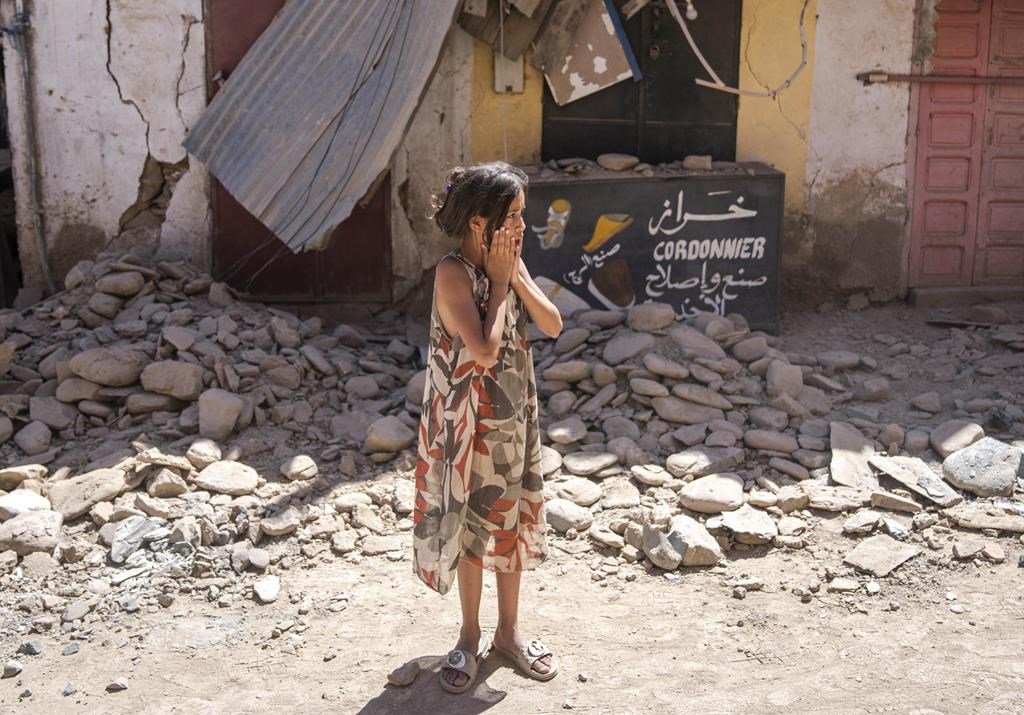Shock and worry among Moroccan Canadians after deadly earthquake

Nearly two days since a deadly earthquake killed more than 2,100 people in Morocco, Montreal’s Café Amistad has become a gathering place for people seeking answers, or at least support.
When news of the deadly quake trickled in on Friday, Chorfi Zouhir kept his shop open late into the night, as customers stayed glued to news channels and tried frantically to call home.
“Everything was upside down,” he said in an interview Sunday. “We were looking for information at any price.”
Advertisement
Zouhir said many people spent the early hours trying to get through on the phone to relatives, desperate to know if they were OK. He said initially, the death toll was reported to be in the dozens, then the hundreds. By the time he woke up Saturday morning, “it was multiplying,” he said.
His own family in Casablanca are safe, but he’s shocked by the tragedy that struck his country.
He said he’s also been deeply touched by how many people of all backgrounds have stopped by his café to ask their Moroccan neighbours if their families are safe.
Prime Minister Justin Trudeau expressed his condolences to the people of Morocco in a social media post, and said Canada is ready to help however it can.
“My heart breaks for the people of Morocco, following yesterday’s devastating earthquake,” he wrote Saturday on X, formerly known as Twitter. “To those who lost loved ones: Canadians are sending you our deepest condolences.”
Advertisement
At least one mosque in Montreal said it was collecting donations to send to Morocco, while multiple people on a Facebook page dedicated to Moroccan Montrealers posted online, asking how they could help.
There are roughly 100,000 Canadians of Moroccan decent, according to the latest census. About 81,000 Moroccan Canadians live in Quebec, and nearly half of that population is in Montreal.
More than 2,400 were also confirmed injured after Morocco was shaken by a 6.8 magnitude earthquake that hit late Friday about 70 kilometers south of Marrakech.
On Sunday, the streets of the historic city were filled with police and army vehicles, according to a Newfoundland man who was attending a UNESCO conference in Marrakech when the quake hit.
John Norman, the mayor of Bonavista, N.L., said he was getting ready for bed on Friday when the room began to shake.
Advertisement
While it started slowly, he said the large jolts began within seconds.
“The ceiling began to move, and dust began to come down,” he said in an interview. “The ceiling light fixtures in the bathroom fell out of the ceiling and I said, ‘we’re leaving.'”
Norman said he was lucky that neither he nor other Canadian delegation members were hurt, and that their hotel is well-built and sustained only minor damage. However, he said it’s painful to hear the stories from hotel staff whose families have lost homes, and to see priceless historic sites damaged or destroyed.
He’s also aware that his own story could have ended in a different way. Originally, he was scheduled to conclude the conference with a field mission to the Atlas Mountains — near the epicentre of the tragedy — and to stay in a hotel that is now “no more,” he said.
“We’re all very lucky and we all realize it,” he said.
Advertisement
He said the money for that expedition has been donated to earthquake relief, and that a donation centre has been set up outside the hotel where he’s staying. Conference attendees and others staying in the less-damaged areas have also donated blood as well as bottled water, he said.
Global Affairs Canada said in a statement on Sunday it was not aware of any Canadians injured or killed in the earthquake but the agency is providing assistance to 50 Canadian citizens in the area.
The agency also said Morocco has not requested international assistance. However, Canada “is in contact with key humanitarian partners to assess needs, should the Government of Morocco welcome assistance,” the statement said.
“The death toll is expected to rise, with authorities expressing difficulty accessing the hardest-hit areas and villages in the High Atlas mountains,” the agency added.
“Aftershocks continue to be felt in the area and threaten to further destabilize already weakened infrastructure…Our hearts are with the families and friends of the people who lost their lives in the earthquake, as well as with all people affected.”
Advertisement
— With files from The Associated Press
This report by The Canadian Press was first published Sept. 10, 2023.
Morgan Lowrie, The Canadian Press